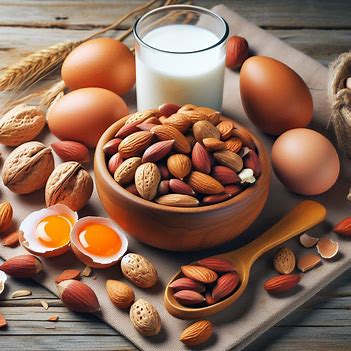Healthy Eating
Nuts with More Protein Than an Egg

Nuts with More Protein Than an Egg. Eggs are a popular protein source, with a large egg providing about 6 grams of protein. However, if you’re looking for nuts that pack more protein than an egg, here are some dietitian-recommended options. Nuts are not only rich in protein but also loaded with healthy fats, fiber, and other essential nutrients.
1. Peanuts
- Protein content: Approximately 7 grams of protein per ounce (about a small handful or 28 grams).
- Why they’re great: Technically a legume, peanuts are often grouped with nuts due to their similar nutrient profile. They’re rich in healthy monounsaturated fats and contain important nutrients like magnesium and niacin.
- How to use them: Enjoy them as a snack, in peanut butter form, or tossed into salads or stir-fries.
2. Almonds
- Protein content: Approximately 6 grams of protein per ounce.
- Why they’re great: Almonds are high in vitamin E, an antioxidant that helps protect cells from damage. They’re also a great source of fiber, healthy fats, and magnesium.
- How to use them: Almonds can be eaten as a snack, added to smoothies, or used as almond butter in spreads and sauces.
3. Pistachios
- Protein content: Approximately 6 grams of protein per ounce.
- Why they’re great: Pistachios are not only high in protein but also rich in fiber and healthy fats. They’re a great option for those looking to boost heart health, as they contain antioxidants and anti-inflammatory compounds.
- How to use them: Snack on shelled pistachios or add them to baked goods, salads, or yogurt bowls.
4. Cashews
- Protein content: Approximately 5 grams of protein per ounce.
- Why they’re great: Cashews are rich in healthy monounsaturated fats and minerals like copper and magnesium, which support energy production and bone health.
- How to use them: Enjoy cashews raw, roasted, or blended into creamy sauces or dips.
5. Walnuts
- Protein content: Approximately 4.5 grams of protein per ounce.
- Why they’re great: Walnuts are particularly high in omega-3 fatty acids, which have anti-inflammatory properties and are great for brain health. They also provide a good balance of protein, healthy fats, and fiber.
- How to use them: Use walnuts in baked goods, salads, or mix them into your morning oatmeal.
6. Hazelnuts
- Protein content: Approximately 4 grams of protein per ounce.
- Why they’re great: Hazelnuts are rich in healthy fats, vitamin E, and fiber, making them a good addition to a heart-healthy diet. While their protein content is slightly lower than other nuts, they still make a nutritious choice.
- How to use them: Hazelnuts can be eaten raw, roasted, or added to granola, chocolate spreads, or desserts.
Honorable Mentions (Nut-like Foods)
1. Pumpkin Seeds (Pepitas)
- Protein content: Approximately 9 grams of protein per ounce.
- Why they’re great: Pumpkin seeds are a protein powerhouse and also rich in magnesium, zinc, and healthy fats. They’re especially great for supporting immune function and muscle health.
- How to use them: Snack on roasted pumpkin seeds, sprinkle them on salads, or blend them into smoothies.
2. Sunflower Seeds
- Protein content: Approximately 6 grams of protein per ounce.
- Why they’re great: Sunflower seeds are a fantastic source of vitamin E and selenium, which support skin health and protect against oxidative stress.
- How to use them: Add sunflower seeds to your trail mix, sprinkle them over salads, or enjoy them as a snack.
3. Chia Seeds
- Protein content: Approximately 4.7 grams of protein per ounce.
- Why they’re great: Chia seeds are an excellent source of fiber, omega-3 fatty acids, and antioxidants. Despite their small size, they pack a solid protein punch.
- How to use them: Mix chia seeds into smoothies, make chia pudding, or sprinkle them over yogurt or oatmeal.
Maximizing Protein from Nuts
To get the most out of nuts in terms of protein:
- Pair them with other high-protein foods: Combine nuts with seeds, yogurt, or legumes to create a more balanced, protein-packed meal.
- Include a variety of nuts: Different nuts offer unique nutrients, so eating a variety can help ensure you’re getting a wide range of benefits.
While nuts can be high in calories due to their fat content, they are nutrient-dense and provide essential vitamins and minerals. Including them as part of a balanced diet can be an excellent way to meet your daily protein needs.